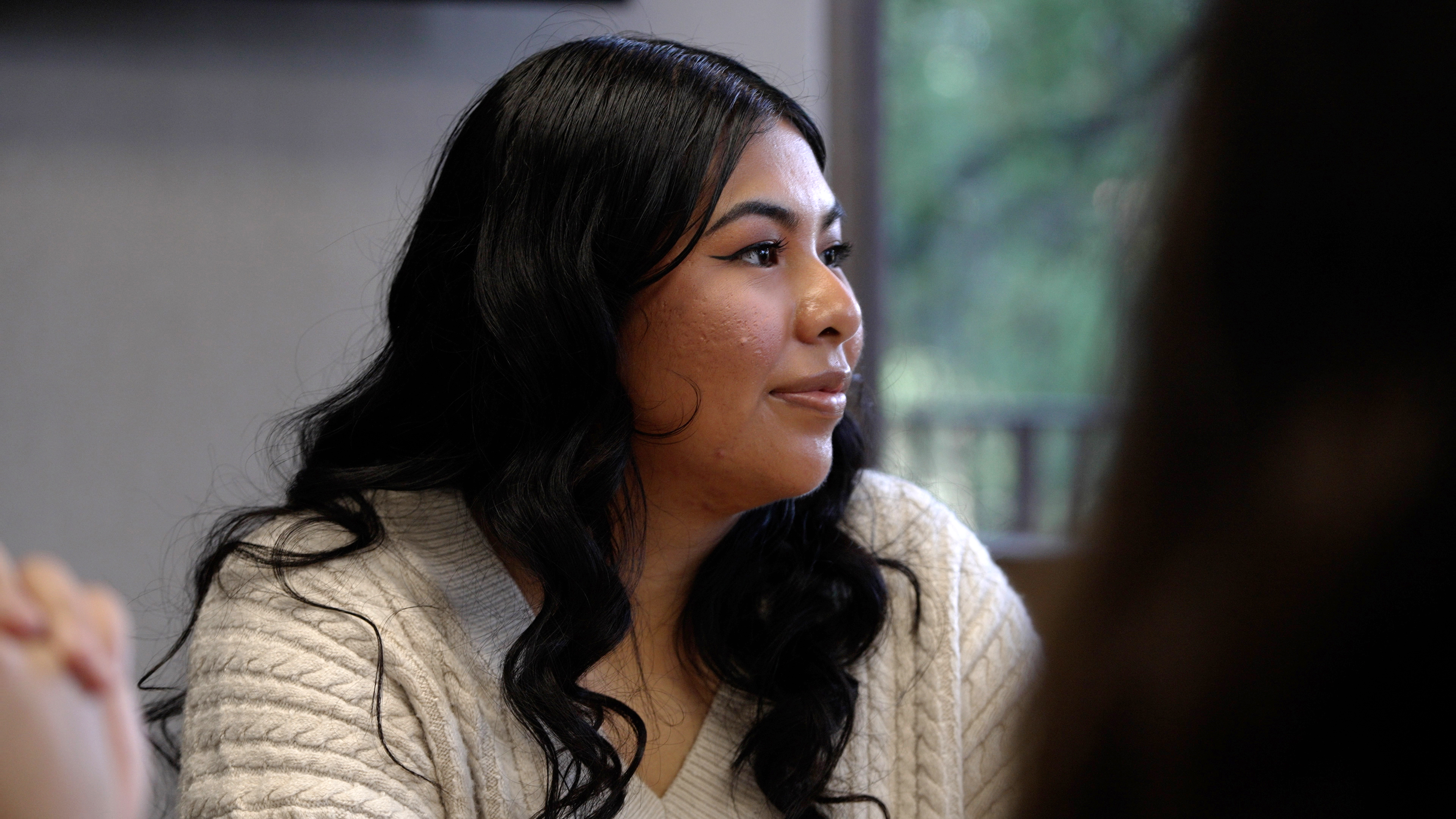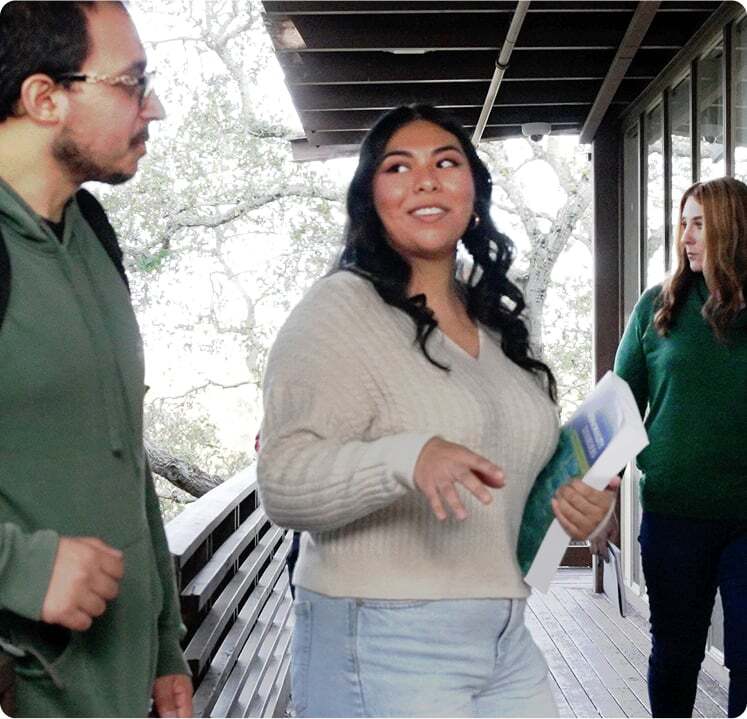
Bachelor of Science Psychology
Transfer Credits - Shorten Your Path to a Degree
With a strong emphasis on cultural humility, social justice, and client well-being, our Bachelor’s programs equip you with in-demand skills and relevant training that support your professional success. If you have a significant number of transfer credits, you may be able to complete your degree in as little as 1-2 years.
Whether you’re studying full-time or balancing work and family commitments with part-time classes, we’ll work with you to create a timeline that fits your unique needs.
Bachelor of Science in Psychology
Launch Your Career in Mental or Behavioral Health
Success in life depends on how effectively people collaborate, how leaders inspire teams, and how organizations connect with the communities they serve. Psychology provides the scientific foundation for understanding human behavior and using that knowledge to help individuals, organizations, and communities thrive.
The BS in Psychology prepares you for entry-level roles in social services, community advocacy, and client support, with flexible online classes designed for real-world impact. The program also creates a strong pathway to PAU’s graduate degrees, supporting your long-term professional growth.
Whether you are completing your Associate Degree or returning as a working professional to finish your Bachelor’s, PAU’s BS in Psychology equips you with the knowledge, practical skills, and confidence to move your career forward.

Why Choose PAU?
At Palo Alto University, we help you build a degree plan that fits your goals and life.
Request Information
Why Choose BS in Psychology
PAU’s Bachelor program prepares you with the knowledge and experience needed to launch your career or continue to licensure-eligible graduate programs.
Already working in behavioral health?
You may qualify for course credit toward your degree based on your experience.
1-2 Years
Complete your Bachelor's degree in 1-2 years to start your career in mental and behavioral health.
In the Age of AI, Human Skills Define the Future of Work
As Artificial Intelligence reshapes the workplace, the most valuable professionals will be those who do what technology cannot — understand people, inspire innovation, and connect insight to action.
With PAU’s Bachelor of Science in Psychology, you’ll graduate ready for a future where human understanding drives leadership, creativity, and impact.

Career Outcomes: Two Paths, One Advantage
Graduates of Palo Alto University’s BS in Psychology program typically take one of two main paths: they either enter the workforce in entry-level positions or pursue further studies at the graduate level.
Regardless of the path chosen, students develop valuable skills in human insight, communication, and leadership that distinguish them in any professional setting.
Psychology Career Paths
A BS degree from PAU can lead directly to an entry-level position in highly rewarding fields.

The following are just samples of careers that graduates can pursue:
- User Experience and Digital Mental Health - Provide expertise and insight to optimize how clients and customers interact with internet-based applications and resources.
- Human Resources Manager – hire, develop, and retain top talent
- Career Counselor- help career-oriented students and job seekers discover their potential.
- Case Manager- provide direct support to individuals and communities in need of behavioral and mental health services.
- Employee Wellness & Employee Assistance Program Coordinator – bridge mental health support with organizational human resource strategies.
- Program Manager (Behavioral Health or Social Services) – oversee programs that serve communities, with the skills to fund, scale, and evaluate.
- Healthcare Administration– manage clinic and counseling centers within government and non-profit programs.

*Source: U.S. Bureau of Labor Statistics
Your Community Needs You
- 74,000+ Mental Health and Social Work Job Openings Annually*
- 19%+ Growth in Counseling & Social Work Fields*
- A Bachelor’s Degree Provides a Strong Foundation for Entry-Level Roles and Graduate Study
Program Highlights
Online Courses
Small Class Size
Personalized Academic Plan
Graduate Degree Paths: Build on Your Foundation
Many students use PAU’s BS in Psychology degree as a launchpad to graduate study. This program gives you a strong foundation to stand out in competitive admissions.
Whether your path leans toward business or psychology, this degree builds the strong academic foundation and human insight needed to stand out in competitive master’s and doctoral programs — from MBA and public policy to counseling and clinical psychology.

Business-Leaning Graduate Pathways with a Psychological Edge
- MBA - (Master of Business Administration) – lead with both strategy and insight into people.
- M.P.H (Master of Public Health) – blend behavioral science and management to shape health and social programs.
- M.P. in Human Resources / Industrial Relations - advance into HR leadership roles.
- Business Consultant / Management Analyst – solve organizational challenges with data and human insight.
- MS in Organizational Leadership / Management – specialize in innovation and change management.
- MS / PhD in Industrial-Organizational Psychology – apply behavioral science to HR, consulting, and organizational strategy.
- M.Ed. in Learning & Development – prepare for leadership in training and workforce development.
- MS in Marketing or Consumer Behavior - drive growth with behavioral insight into consumers.
Psychology-Leaning Graduate Pathways with a Human Services Edge
- MS in Psychology– fully online with concentrations and a PhD Pathway; ideal for advancing research, education and doctoral prep.
- MA in Clinical Mental Health Counseling (CMHC) - CACREP accredited, preparing students for licensure and professional practice; offered online and hybrid.
- Master of Social Work (MSW) - online program with evening classes and weekend residencies; designed for working professional entering clinical and leadership roles in California's behavioral health system.
- PhD in Clinical Psychology - APA-accredited; blends research and clinical training with strong internship and postdoc placement.
- PsyD PAU-Stanford Consortium - APA-accredited program in partnership with Stanford University School of Medicine; focused on directly delivering clinical psychology services.
- PhD in Counselor Education & Supervision - prepares culturally-affirming counselor educators and supervisors, advancing research and leadership in the counseling profession.

Who Should Apply?
- Career changers and working adults balancing school, work, and family
- Transfer students from community colleges seeking a fast, flexible degree
- First-generation college students looking for personalized support
- Military veterans seeking credit for service and training
- International students ready to study fully online from their home country
- Individuals aiming for careers in psychology, business, social work, or human services
- Students seeking a clear pathway to graduate school and meaningful employment
Application Deadline
Enroll in Any Quarter and Start Your Journey at PAU!
- Spring Quarter Deadline
March, 20, 2026 - Summer Quarter Deadline
June 12, 2026 - Fall Quarter Deadline
End of August, 2026
Please visit our State Authorization page to see if we operate in your state.
Learn More"Strong Internships Placements and Industry Connections"
“PAU came highly recommended for its strong internship placements and industry connections, which made it an easy choice for me.”

Maggie Tsai
"Small Cohort Where You Have a Great Student to Faculty Ratio"
“The reason I chose PAU is because I found a true sense of belonging here, and there's this focus on a small cohort where you have a great student to faculty ratio. And to me, that was quite important. That's the support I needed. You're made to feel welcome from day one. ”

David Rouxel PhD in Clinical Psychology Student
"Living Up to Their Mission"
“The hope PAU gave me. It has been indescribable, because I didn't think I would be where I am today and, thanks to PAU, like PAU made that happen. So they're definitely living up to their mission.”

Javi Garces BS in Psychology and Social Action Student
"A Sense of Community is One of the Major Assets"
“We have a culture here in the University of support among cohorts and students and even across different cohorts. That is something that also is very helpful. And I think that the university actively stimulates these types of spaces. Having a sense of community is one of the major assets that you get here at PAU.”

Michel Rattner PhD in Clinical Psychology Student
William H. Snow, PhD, Chair, Department of Undergraduate Studies
Info & Curriculum
Bachelor of Science in Psychology Offered Fully Online and In-Person Internship (option)
This program is ideal for students with a passion for community advocacy and outreach. Whether you need the flexibility of online learning or prefer an in-person experience, our supportive PAU community ensures you can earn your degree while balancing your personal and professional commitments.
The BS in Psychology focuses on developing the psychological knowledge and skills for entry-level client advocacy and outreach, as well as graduate school preparation. The Psychology curriculum includes core classes in psychology, two quarters of field experience, and additional non-core electives. Graduates can find roles at nonprofits and social service agencies or prepare for graduate programs in psychology, counseling, and social work.
Senior Internship
A six-month senior internship provides practical experience in applying newly acquired skills at nonprofit or community agencies. The internship gives students experience with the practical applications of psychology and helps them explore career options. Students may supplement their training through extracurricular opportunities and research projects with our graduate faculty.
| BS in Psychology | Curriculum | 56 Quarter Units |
|---|---|---|
| PSYC300 | Psychological Writing | 4 |
| PSYC310 | Psychology of Learning & Memory | 4 |
| PSYC320 | Social Psychology | 4 |
| PSYC330 | Theories of Personality | 4 |
| PSYC340 | Scientific Inquiry in Psychology | 4 |
| PSYC362 | Special Topics | 4 |
| PSYC375 | Cross-Cultural Psychology | 4 |
| PSYC380 | Psychology of Lifespan Development | 4 |
| PSYC385 | Theories of Counseling & Psychotherapy | 4 |
| PSYC390 | Abnormal and Clinical Psychology | 4 |
| PSYC395 | Senior Internship | 8 |
| PSYC400 | Senior Seminar | 4 |
| PSYC440 | Human Behavior & Interpersonal Effectiveness | 4 |
Info & Curriculum
If your interested in our Business Psychology degree learn more here.
BS in Business Psychology Offered Fully Online
Palo Alto University’s online business psychology degree is ideal for students who are transferring from a community college or another university. It’s also suitable for adult learners who want to complete their bachelor’s degree with previously earned college credits.
The bachelor program equips graduates to apply the science of human behavior to business challenges, such as employee motivation, sales and marketing, consumer behavior, and human resource management. Graduates can pursue a wide variety of careers, including careers in sales and marketing, human resources, and management, as well as graduate programs in business, psychology, organizational behavior, and related fields.
| BS in Business Psychology | Curriculum | 56 Quarter Units |
|---|---|---|
| BUSI302 | Business Writing Fundamentals | 4 |
| BUSI303 | Business Communication | 4 |
| BUSI309 | Organizational Behavior | 4 |
| BUSI310 | Employee Motivation and Satisfaction | 4 |
| BUSI320 | Fundamentals of Management | 4 |
| BUSI340 | Human Resources Management | 4 |
| BUSI381 | Career Planning & Development | 4 |
| BUSI383 | Introduction to Marketing | 4 |
| BUSI395 | Fundamentals of Accounting & Finance | 4 |
| BUSI405 | Information Technology Management | 4 |
| BUSI406 | Senior Seminar | 4 |
| BUSI412 | Corporate Accounting and Finance | 4 |
| BUSI430 | Business Ethics | 4 |
| PSYC340 | Scientific Inquiry in Psychology | 4 |
Five Reasons to Make PAU Your Transfer Choice
- Affordable & Accredited — Flexible & Fast
- 80% Graduation Rate (Compared to 60% National Average)
- Transfer Friendly Pathways: Community College
- 50-Year Legacy of Psychology Education and 16-Year Legacy of Online Education
- Psychology Majors with 21st Century Relevance

BS in Psychology
Admissions Requirements
+Applicants must hold a bachelor's degree from a regionally-accredited institution or the international equivalent. For applicants to the MA in Clinical Mental Health Counseling Online program, you must be located in a state in which we are authorized to provide online education. While no prerequisites are required to apply, we strongly recommend applicants to have related volunteer or work experience in the mental health field.
GRE scores are not required for admissions to PAU master's degree programs. GRE scores will not be considered in the review of applications, even if students provide them.
Palo Alto University offers students a multicultural focus that emphasizes culture, social justice, and families that students experience in weekly live classes. Students benefit from the latest academic research and clinical approaches while tailoring their experience to the culture and community in which they live and practice, all in a program format that fits into their busy lives.
- The hybrid program is offered weekday evenings. Courses are held on the PAU campuses or live via Zoom.
- Classes take place Monday-Thursday evenings from 4-6 pm or 6-8 pm or 6-8:50 pm, depending on the cohort.
- All skill-based clinical work is done in an appropriate clinical or classroom setting
With the time savings from your online classes, you will be able to take three classes per quarter – which means earning your degree in just nine quarters. Staying local while participating in a distance learning (online) master’s degree program gives students the best of both worlds.
Online: Distance Learning Format
+Applicants must hold a bachelor's degree from a regionally-accredited institution or the international equivalent. For applicants to the MA in Clinical Mental Health Counseling Online program, you must be located in a state in which we are authorized to provide online education. While no prerequisites are required to apply, we strongly recommend applicants to have related volunteer or work experience in the mental health field.
GRE scores are not required for admissions to PAU master's degree programs. GRE scores will not be considered in the review of applications, even if students provide them.
Palo Alto University offers students a multicultural focus that emphasizes culture, social justice, and families that students experience in weekly live classes. Students benefit from the latest academic research and clinical approaches while tailoring their experience to the culture and community in which they live and practice, all in a program format that fits into their busy lives.
- The hybrid program is offered weekday evenings. Courses are held on the PAU campuses or live via Zoom.
- Classes take place Monday-Thursday evenings from 4-6 pm or 6-8 pm or 6-8:50 pm, depending on the cohort.
- All skill-based clinical work is done in an appropriate clinical or classroom setting
With the time savings from your online classes, you will be able to take three classes per quarter – which means earning your degree in just nine quarters. Staying local while participating in a distance learning (online) master’s degree program gives students the best of both worlds.
MA in Counseling Residencies: Residency Information
+Applicants must hold a bachelor's degree from a regionally-accredited institution or the international equivalent. For applicants to the MA in Clinical Mental Health Counseling Online program, you must be located in a state in which we are authorized to provide online education. While no prerequisites are required to apply, we strongly recommend applicants to have related volunteer or work experience in the mental health field.
GRE scores are not required for admissions to PAU master's degree programs. GRE scores will not be considered in the review of applications, even if students provide them.
Palo Alto University offers students a multicultural focus that emphasizes culture, social justice, and families that students experience in weekly live classes. Students benefit from the latest academic research and clinical approaches while tailoring their experience to the culture and community in which they live and practice, all in a program format that fits into their busy lives.
- The hybrid program is offered weekday evenings. Courses are held on the PAU campuses or live via Zoom.
- Classes take place Monday-Thursday evenings from 4-6 pm or 6-8 pm or 6-8:50 pm, depending on the cohort.
- All skill-based clinical work is done in an appropriate clinical or classroom setting
With the time savings from your online classes, you will be able to take three classes per quarter – which means earning your degree in just nine quarters. Staying local while participating in a distance learning (online) master’s degree program gives students the best of both worlds.
Tuition & Fees
+Applicants must hold a bachelor's degree from a regionally-accredited institution or the international equivalent. For applicants to the MA in Clinical Mental Health Counseling Online program, you must be located in a state in which we are authorized to provide online education. While no prerequisites are required to apply, we strongly recommend applicants to have related volunteer or work experience in the mental health field.
GRE scores are not required for admissions to PAU master's degree programs. GRE scores will not be considered in the review of applications, even if students provide them.
Palo Alto University offers students a multicultural focus that emphasizes culture, social justice, and families that students experience in weekly live classes. Students benefit from the latest academic research and clinical approaches while tailoring their experience to the culture and community in which they live and practice, all in a program format that fits into their busy lives.
- The hybrid program is offered weekday evenings. Courses are held on the PAU campuses or live via Zoom.
- Classes take place Monday-Thursday evenings from 4-6 pm or 6-8 pm or 6-8:50 pm, depending on the cohort.
- All skill-based clinical work is done in an appropriate clinical or classroom setting
With the time savings from your online classes, you will be able to take three classes per quarter – which means earning your degree in just nine quarters. Staying local while participating in a distance learning (online) master’s degree program gives students the best of both worlds.
General Grad Degree Requirements
+Applicants must hold a bachelor's degree from a regionally-accredited institution or the international equivalent. For applicants to the MA in Clinical Mental Health Counseling Online program, you must be located in a state in which we are authorized to provide online education. While no prerequisites are required to apply, we strongly recommend applicants to have related volunteer or work experience in the mental health field.
GRE scores are not required for admissions to PAU master's degree programs. GRE scores will not be considered in the review of applications, even if students provide them.
Palo Alto University offers students a multicultural focus that emphasizes culture, social justice, and families that students experience in weekly live classes. Students benefit from the latest academic research and clinical approaches while tailoring their experience to the culture and community in which they live and practice, all in a program format that fits into their busy lives.
- The hybrid program is offered weekday evenings. Courses are held on the PAU campuses or live via Zoom.
- Classes take place Monday-Thursday evenings from 4-6 pm or 6-8 pm or 6-8:50 pm, depending on the cohort.
- All skill-based clinical work is done in an appropriate clinical or classroom setting
With the time savings from your online classes, you will be able to take three classes per quarter – which means earning your degree in just nine quarters. Staying local while participating in a distance learning (online) master’s degree program gives students the best of both worlds.

CACREP Accreditation Fully Accredited Training
Our mix of academic offerings lends itself well to lifelong learners. Bachelor’s, master’s, and doctorate degrees can be complemented with our continuing education programs, all of which strengthen clinical, research, and on-the-job skills.
Cohort Model
PAU’s on-campus format uses a cohort system. You will be assigned to a group of students who will have the same schedule and sequence of courses for their entire program. You will be enrolled continuously and to complete your degree on schedule with their cohort.
Why Cohorts?
Support and openness – you will study together, encouraging and assisting others when needed. You will also develop the familiarity and trust to discuss tough issues and personal experiences.
Cohort Model
PAU’s on-campus format uses a cohort system. You will be assigned to a group of students who will have the same schedule and sequence of courses for their entire program. You will be enrolled continuously and to complete your degree on schedule with their cohort.
Why Cohorts?
Support and openness – you will study together, encouraging and assisting others when needed. You will also develop the familiarity and trust to discuss tough issues and personal experiences.
Cohort Model
PAU’s on-campus format uses a cohort system. You will be assigned to a group of students who will have the same schedule and sequence of courses for their entire program. You will be enrolled continuously and to complete your degree on schedule with their cohort.
Why Cohorts?
Support and openness – you will study together, encouraging and assisting others when needed. You will also develop the familiarity and trust to discuss tough issues and personal experiences.
Cohort Model
PAU’s on-campus format uses a cohort system. You will be assigned to a group of students who will have the same schedule and sequence of courses for their entire program. You will be enrolled continuously and to complete your degree on schedule with their cohort.
Why Cohorts?
Support and openness – you will study together, encouraging and assisting others when needed. You will also develop the familiarity and trust to discuss tough issues and personal experiences.
Online & Hybrid Learning Format
The hybrid program is offered weekday evenings. Courses are held on the PAU campuses or live via Zoom.
Classes Take Place:
Monday-Thursday Evenings
4-6PM PST or 6-8PM PST or 6-8:50PM PST (Depending on Cohort)
All skill-based clinical work is done in an appropriate clinical or classroom setting. And with the time savings from your online classes, you will be able to take three classes per quarter – and that means earning your degree in just nine quarters.
Staying local while participating in a distance learning (online) master’s degree program gives students the best of both worlds.
Palo Alto University offers students a multicultural focus that emphasizes culture, social justice, and families that students experience in weekly live classes. Students benefit from the latest academic research and clinical approaches while tailoring their experience to the culture and community in which they live and practice, all in a program format that fits into their busy lives.
The hybrid program is offered weekday evenings. Courses are held on the PAU campuses or live via Zoom.
Classes Take Place:
Monday-Thursday Evenings
4-6PM PST or 6-8PM PST or 6-8:50PM PST (Depending on Cohort)
All skill-based clinical work is done in an appropriate clinical or classroom setting. And with the time savings from your online classes, you will be able to take three classes per quarter – and that means earning your degree in just nine quarters.
Staying local while participating in a distance learning (online) master’s degree program gives students the best of both worlds.
Palo Alto University offers students a multicultural focus that emphasizes culture, social justice, and families that students experience in weekly live classes. Students benefit from the latest academic research and clinical approaches while tailoring their experience to the culture and community in which they live and practice, all in a program format that fits into their busy lives.
How to Apply
PAU's application process is designed with busy students in mind. No letters of recommendation or application fees are required. Students should plan to complete most of their general education requirements prior to enrolling at PAU.
Learn how your credits will transfer before you applySubmit a Transcript Evaluation Today
Online Format
+PAU’s online learning format takes the distance out of distance learning.
Undergraduate degrees are offered as virtual-remote online programs. Each course includes a weekly Zoom video-conferencing session of 1 hour and 20 minutes where you will interact with your course instructor and fellow students. Class Sessions are held between Monday and Thursday at either 6:00 PM PST or 7:30 PM PST.
Please note that online students must be located in a state in which PAU is authorized to provide online education.
General Education (GE) Requirements
+Prior to enrolling at PAU, undergraduate students are asked to complete approximately 90 quarter units (60 semesters) including General Education courses. PAU's general education requirements largely mirror the requirements to transfer to a California State University (CSU) or University of California.
We have outlined below a general articulation plan as it relates to courses guaranteed to transfer from a CA community college to the CSU system. This list is not comprehensive - we encourage students to complete a transfer evaluation to get a clear sense of how many courses they may transfer to PAU. You can also visit assist.org to see a list of courses at your community college that are certified to meet the general education requirements.
| Area | Requirement | Sub Areas |
|---|---|---|
| Area A - English Language, Communication, and Critical Thinking | Minimum of 9 semester units or 12 quarter units | A1 - Oral Communication A2 - Written Communication A3 - Critical Thinking |
| Area B - Scientific Inquiry | Minimum of 6 semester units or 8 quarter units. Includes one course from each: Physical Science and Life Science | B1 - Physical Sciences B2 - Life Science |
| Area C - Arts and Humanities | Minimum of 9 semester units or 12 quarter units. Select courses in at least two disciplines. | C1 - Art C2 - Humanities |
| Area D - Social Sciences | Minimum of 9 semester units or 12 quarter units. Select courses in at least two disciplines | Any Area D |
| Area E - Human Understanding and Development | Minimum of 3 semester units or 4 quarter units. | Any Area E |
| Mathematics | Minimum of 3 semester units or 4 quarter units of transfer-level math. Statistics also satisfies this requirement. | B4 - Mathematics / Quantitative Reasoning |
Completing GE Courses (while enrolled @ PAU)
Although students are encouraged to complete all general education requirements prior to enrolling, students may complete some while enrolled at PAU. Students will need to develop an Individualized Education Plan with their academic advisor prior to the start of classes. This plan will outline the remaining general education requirements and a mechanism for their completion. This can include:
- College Level Examination Program ( CLEP)- https://clep.collegeboard.org/
- Accredited community college courses
- Classes at other accredited 4-year institutions
- Straighterline courses- https://www.straighterline.com/
- Sophia courses- www.sohpia.org
- PAU courses fulfilling GE requirements
Foreign Language Competency Assessment- https://www.avantassessment.com/languages
Admissions Eligibility
+PAU works to keep the admissions process quick and easy. For consideration for admission into our bachelor’s degree programs, you must have completed approximately 90 units (60 semester) of transferrable college-level coursework. This can include credit granted for alternative forms of education, such as
- Experiential Learning Credit (granted after a university portfolio review)
- Foreign Language Competency (granted after a review of a taped formal interview and writing sample)
- Military Education Credit for Veterans (https://www.va.gov/resources/how-do-i-get-college-credits-for-my-military-service/)
- College Level Examination Program (CLEP) (https://clep.collegeboard.org/)
- High School Advanced Placement (AP) and International Baccalaureate Exams (IB)
Course credits that are not awarded as general education or major requirement transfer credit may still transfer as elective units, upon review and approval of the Department Chair. A complete summary of transferable credits will be provided to admitted students before the deposit deadline.
Bachelor's Application Requirements
Ready to continue your educational journey at PAU? With no letters of recommendation and no application fee, we have streamlined the application process to make it easy for you.
When applying to Palo Alto University, you must complete the following criteria:
- Submit an Online Application
- Submit unofficial transcripts from all previous institutions attended
- Final official transcripts from all colleges attended are required for enrolling students. We recommend you arrange to have them sent to PAU by the first day of classes. PAU places a registration hold on your student record if we do not receive transcripts in time. Failure to submit final official transcript(s) by the end of the first term results in being dropped from classes.
- Completion of the following courses:
- Intermediate Algebra or higher
- General education requirements
- At least 84 transferrable quarter units completed at the time of enrollment. Only courses from regionally accredited institutions with a grade of C or higher are transferable and must be at the 100 level (non-remedial) or equivalent to be eligible for transfer.
Transferable units may include: - Psychology Courses
- General Education units
- Lower-division or upper-division elective units
- Upper-division transfer units applicable to major requirements
- Alternative forms of general education or elective units, such as AP tests, IB tests, CLEP, and US Military credit
Application Deadline
+Enroll in Any Quarter and Start Your Journey at PAU!
- Summer Quarter Deadline: June 16, 2025
- Fall Quarter Deadline: End of August, 2025
- Winter Quarter Deadline: December 12, 2025
- Spring Quarter Deadline: March, 20, 2026
- Summer Quarter Deadline: June 12, 2026
- Fall Quarter Deadline: End of August, 2026
Apply Now to Start This Winter, Spring, Summer, or Fall.
The Office of Admissions must receive all application materials before the application review can take place. Once we receive your application, an admissions counselor reviews your application and schedules a meeting to discuss your goals and enrollment plans.
Graduation Requirements
- Completion of general education requirements
- Completion of all classes required for the major
- 180 quarter units in total
- Completion of 45 upper-division quarter units
- 45 units must be completed at Palo Alto University
- Students must complete a minimum of 30 units in their major at PAU, and must be enrolled at PAU during the last two terms prior to graduation.
Tuition & Fees
+Visit our Tuition and Cost page or contact our Financial Aid department to learn more.
Additional Concentrations
+Students who complete at least twenty focused units in an additional area of specialty may petition the Department Undergraduate Studies Chair to have an academic concentration listed on their transcripts.
For example, an individual completing the requirements for a BS in Psychology may have also taken 20 business units for a business concentration.

Office of Admissions
At Palo Alto University, we’re eager to help you take the next step in your education. You might be advancing your studies, changing direction, or exploring new opportunities—our Admission and Outreach team is ready to guide you with personalized support.
Undergraduate Frequently Asked Questions
Transfer Credit Guidelines
+Credit evaluation begins with a review of submitted transcripts. Courses from regionally accredited institutions with a grade of C or higher are transferable and must be at the 100-level (non-remedial) or equivalent in order to be eligible for transfer. Members of the Office of Admissions staff determine initial credit for general education courses or elective units.
Credit Evaluation for General Education and Elective Units
+- Members of the Office of Admissions staff determine credit for general education courses or elective units.
- Credit evaluation begins with review of transcripts. Classes that are already articulated (meaning already identified as completing CSU A-E requirements), and for which the student received a C grade or better, are automatically credited.
- The Associate Director of Admission evaluates non-articulated courses on a case-by-case basis. This process determines whether a course sufficiently matches the content and learning outcomes for a general education course. This evaluation is usually completed by reviewing the catalog entry for the course in question but may require a review of the course syllabus.
Credit Evaluation for Major Requirements
+- Undergraduate program faculty determine transfer credit for major requirements.
- Students requesting transfer credit toward their major should consult with their academic advisor.
General Guidelines
+- Courses that are not awarded as general education or major requirement transfer credit may still transfer as elective units, upon review and approval of the Associate Director of Admissions.
- A complete summary of transferable credits will be provided to admitted students.
- College Level Examination Program (CLEP) exams (MIN SCORE OF 50), High School Advanced Placement (AP) exams (MIN SCORE OF 3) and International Baccalaureate (IB) exams (MIN SCORE OF 4) may be used as substitutes for some general education requirements.
- Only courses from regionally accredited institutions with a grade of C or higher are transferable and must be at the 100-level (non-remedial) or equivalent in order to be eligible for transfer.
Transfer Credit Policy for Veterans
+Palo Alto University’s undergraduate programs will evaluate courses taken in the armed services for transfer credit. In order to have your military educational experiences evaluated for credit, you must submit evaluated transcript(s) from the appropriate agency.
The Army, Navy, Marine Corps, and Coast Guard now use the centralized Joint Services Transcript System, which will electronically send your official transcript to PAU upon your request. The transcript includes your military training and occupational experience along with American Council on Education college credit recommendations. The Air Force uses the Community College of the Air Force.
Palo Alto University considers both military service and military coursework for academic credit using the guidelines issued by the American Council on Education (ACE). We refer to the ACE “Guide to Evaluation of Educational Experiences in the Services” when determining applicable transfer credit for military experience and training. Job specialties (MOS, AFSC, Rate) must have a recommendation evaluation by ACE (in the ACE Guide) for credit to be awarded.
What are the senior internship requirements?
+Students in the BS in Psychology program are required to complete a six-month senior internship as part of their studies. The internship gives students experience with the practical applications of psychology and social action and helps them explore career options.
Students interested in research have the opportunity to intern as a research assistant with professors actively engaged in psychological research. Students who prefer to work in a community agency, clinical setting or other social action setting intern in local community agencies and organizations.
Senior interns will earn academic credit toward graduation. They work approximately eight hours per week at their internship site, while also completing required senior course work. Students already employed in social service settings may be able to do their internship at their place of employment with the approval of their faculty advisor.
At their internship sites, students are supervised by a professional member of the agency staff. They are also mentored by a PAU professor, who helps them integrate their internship experiences with their coursework.
Internship sites may include community mental health centers, schools, community service agencies, nonprofit organizations, or other similar settings. Organizations at which PAU students have interned include:
- Alameda Police Department
- Bill Wilson Center
- Boys & Girls Club of the Peninsula
- Catholic Charities
- Children's Health Council
- County of Santa Cruz Health Services Agency
- Family Matters In-Home Care, LLC
- Kaiser Permanente
- Salvation Army
- Santa Clara County Social Services
- Service League of San Mateo County
- Silicon Valley Animal Shelter
- Social Media Marketing University
- Stanford University School of Medicine – Research Assistance
- Target Specialty Products
- Trumpet Behavioral Health
- Ujima Adult and Family Services, Inc.
What is the difference between a BS (Bachelor of Science) and a BA (Bachelor of Arts) degree?
+Palo Alto University (PAU) only offers Bachelor of Science degrees. A Bachelor of Science degree focuses more on science and mathematics courses and is focused on achieving a psychology degree.
On the other hand, a Bachelor of Arts degree generally requires more liberal arts courses, such as foreign language and humanities.
What is rolling admissions?
+Enroll in Any Quarter and Start Your Journey at PAU!
Apply Now to Start This Winter, Spring, Summer, or Fall.
As qualified applications are received, students are notified of their acceptance status quickly and efficiently. This allows students to apply early, plan ahead, and prepare for their educational plans.
What are the requirements to transfer into the undergraduate programs?
+Transferring into PAU's undergrad programs is easy and convenient. Students are required to have completed 84 units of transferrable credit.
Transfers from community colleges are welcome, as are students from CSUs, UCs, and other universities from around the country. Contact PAU's admissions office today to obtain more information, meet with an admissions counselor, and go over program options.
Are there scholarships and financial aid available?
+Yes! Since PAU is an accredited institution, students are eligible to receive state, federal, and institutional aid. This gives students both grant and loan options when paying for school. Private scholarships are also available through PAU. Check with the financial aid office for details and deadlines.
What options are there for students to get involved in extra curricular activities?
+Students in PAU's undergraduate programs have many opportunities to participate in the larger community.
Whether enrolled in on-campus or online programs, students are encouraged to get involved. Actively participating in student life enhances learning, creates friendships and builds professional relationships. There are many options for students to get involved in social, service learning, and academic activities.
Academic Support
PAU provides students with resources to excel academically:
- Annual orientations to help students get on their feet quickly and effectively.
- Video conferences in online classes that build strong relationships with instructors and members of their cohort.
- Faculty advisors who help students succeed and get support when they need it.
- Regularly scheduled social events with program directors and faculty to facilitate strong connections.
Career Talks and Professional Speaker Series
Experts in psychology and business disciplines are regularly invited to present talks in their areas of expertise. Recent topics have included international consulting, resume writing and job search tips, careers in forensic psychology, susceptibility to hypnosis, positive psychology, the psychology of terrorists and terrorism, and the adolescent brain.
Social Activities
PAU sponsors large scale events and intimate gatherings, including a research forum, an annual gala, lunch-and-learn networking sessions with industry professionals, and more. These provide opportunities for students to meet faculty and students outside of their program. After students graduate they become part of the PAU Alumni Association.
Student Government
The Undergraduate Student Council offers leadership opportunities for interested students.
Student Organizations
More than 20 university-wide student organizations welcome students to join, such as:
- Students for Ethnic and Cultural Awareness
- PAU Running Group
- Healing, Spirituality, and Social Action Group
- Student Parent Association
- Student Veteran Organization
- and many more!
International Students
+International students are welcome to apply to PAU's undergraduate programs. Since PAU program is taught solely online, International students must remain in their home country while completing the program. No student visa's are offered at this time due to no residential classes.
What are the technology requirements to take online classes?
+PAU uses the ZOOM video conferencing system to foster real-time interaction among professors and students. To experience ZOOM, sign up for an online info session.
Students will need access to a reliable computer with an internet connection to participate in online classes and download course materials. Online students also need a headset with a microphone to join discussions.
All PAU faculty teaching online courses receive training on best practices and instructional effectiveness for online courses.
Military Education Credit for Veterans
+Palo Alto University’s undergraduate programs will accept transfer credit awarded for courses taken in the armed services. In order to have your military educational experiences evaluated for credit, you must submit evaluated transcript(s) from the appropriate agency.
The Army, Navy, Marine Corps, and Coast Guard now use the centralized Joint Services Transcript System, which will electronically send your official transcript to PAU upon your request. The transcript includes your military training and occupational experience along with American Council on Education college credit recommendations. The Air Force uses the Community College of the Air Force.
(https://www.va.gov/resources/how-do-i-get-college-credits-for-my-military-service/)
Palo Alto University considers both military service and military coursework for academic credit using the guidelines issued by the American Council on Education (ACE). We refer to the ACE “Guide to Evaluation of Educational Experiences in the Services” when determining applicable transfer credit for military experience and training. Job specialties (MOS, AFSC, Rate) must have a recommendation evaluation by ACE (in the ACE Guide) for credit to be awarded.

